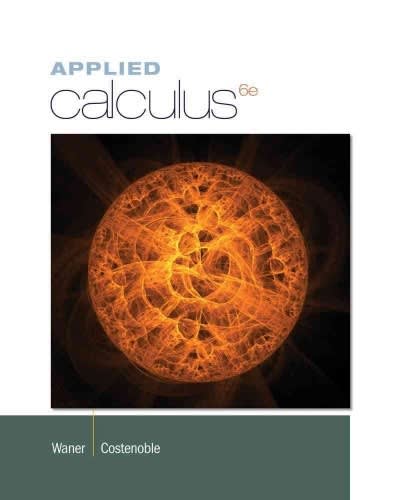Question
Part 1 - CONCEPTS from this module's Learn section (3 pts each = 15 pts) 1)List the three decisions an editor can make concerning a
Part 1 - CONCEPTS from this module's Learn section (3 pts each = 15 pts)
1)List the three decisions an editor can make concerning a manuscript according to Section 12 in the APA Manual.
ANSWER
2)When you submit a manuscript involving human research in the United States, how might you verify that you have complied with ethical standards (according to Section 12 in the APA Manual)?
ANSWER
3)According to the "Final Considerations" presentation, several meta-analyses reveal that many published research studies in our field suffer from low statistical power, primarily due to what?
ANSWER
4)According to the "Final Considerations" presentation, what term is the "probability of correctly rejecting the null hypothesis", and is typically set at 0.8?
ANSWER
5)According to the "Final Considerations" presentation, it is important to include an effect size so that we can assess whattype of significance (that that reveals if it is meaningful rather than just statistically significant)?
ANSWER
Part 2 - SPSS APPLICATIONfrom this module's Learn section
None for this module.
Part 3 - CUMULATIVE can include theoretical, hand-calculations, and use of SPSS over any concepts covered thus far. (8+13 = 21 pts)
6)List one general strength of using nonparametric tests (see Module 4). (2 pts)
ANSWER
7)If your goal is to not only explore a relationship between two variables but also predict one given the value of the other, which type of statistical test is most appropriate? (2 pts)
ANSWER
8)What statistical test is most appropriate if you want to examine whether there is a difference in graduation rates (percentages) among home schooling, public schools, and private schools in your state of residence? Assume the data does NOT meet the assumptions for a parametric test. (2 pts)
ANSWER
9)What statistical test would be most appropriate if you were interested in seeing how religiosity changes in early adulthood? Religiosity was measured using an interval scale, and the same participants provided data at two time points - at age 18 and 28. Assume the data meets all assumptions for a parametric test. (2 pts)
ANSWER
Problem Set 1: (13 pts)
A teacher wanted to see if social anxiety affects performance on an oral assignment. To examine this, students completed social anxiety scales and were classified into "Low," "Average," and "High" levels of social anxiety. The data presented in the table below are the oral presentation grades (in percentages) earned by the 45 students separated by their social anxiety classification. Conduct the most appropriate statistical analysis to determine whether grades on the oral assignment differed based on level of social anxiety. (Hint: see module 1 presentations)
Oral presentation grade (%)
Low
social anxiety
Average
social anxiety
High
social anxiety
72
80
77
68
85
71
73
73
73
75
81
69
97
73
90
73
91
74
95
73
76
88
73
67
89
71
81
97
75
75
88
78
68
89
90
79
93
89
58
89
88
83
79
75
81
10) Paste appropriate SPSS output. (3 pts)
ANSWER
11) Paste appropriate SPSS graph, formatted in APA (2 pts). Write an appropriate figure number and title using APA conventions (e.g., alignment, spacing, font size, use of bold / italics). 2 pts for graph; 2 pts for caption = 4 pts total.
ANSWER
12) Write an APA-style Results section based on your analysis. All homework "Results sections" should follow the examples provided in the presentations and textbooks for that particular statistical test. Don't forget to include a decision about the null hypothesis. Include a callout to Figure 1. (4 pts).
ANSWER
13) Identify a potential confounding variable with the study as it was presented (you can use your imagination!). Justify why you think it may be a confounding rather than an extraneous variable.(2 pts)
ANSWER
Step by Step Solution
There are 3 Steps involved in it
Step: 1

Get Instant Access to Expert-Tailored Solutions
See step-by-step solutions with expert insights and AI powered tools for academic success
Step: 2

Step: 3

Ace Your Homework with AI
Get the answers you need in no time with our AI-driven, step-by-step assistance
Get Started


